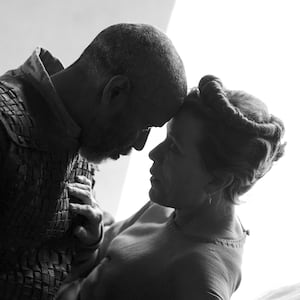Is this Macbeth, or a test kitchen for Hale and Hearty?
A mainly bare stage greets the audience at Macbeth on Broadway (Longacre Theatre, booking to July 10). People—actors we guess, but who knows, it’s all very loosey-goosey—are gathering in front of us, smiling, milling about (the company now back together after COVID forced the cancelation of performances). The lady next to this critic enjoyed the sounds of NPR drifting over us. There are racks of lights, design implements and cartons on the side of the stage (the spare, contemporary design is by Christine Jones), and we see some actors standing, stirring and cooking soup or stew at the front of the stage. It smells delicious.
If these are witches, the modern staging and dress and their modish cooking station suggest Dunsinane has been made over by ABC Carpet and Home; these potions do not smell most foul. The witty actor Michael Patrick Thornton begins telling us some Macbeth back story in a laconic way, mixing in some anecdotes about lockdown and the pandemic. He also tempts fate, with a bored rolling of his eyes, by naming the play—superstition suggests that by naming Macbeth in a theater curses the production.
This untraditional opening to Macbeth sets the tone for much of the production, starring Daniel Craig as the malevolent, sprite-tormented regal serial killer, and Ruth Negga as Lady Macbeth, egging him on until she realizes her husband is dangerously gaga. This Macbeth—the final Broadway show to open in a packed season of Tony Award-eligible productions—is directed by Sam Gold, an innovative maestro of modern staging in exquisitely mounted shows like Fun Home, A Doll’s House: Part 2, and The Glass Menagerie. This critic was one of the few who loved his production of King Lear with Glenda Jackson, and its stage of mounting dusty clutter.
Here, hand-held smoke machines are wielded by actors to provide as much Scottish mist as possible, as the witches predict Macbeth’s ascent from Thane of Cawdor to king. Macbeth and his wife plot their killing spree, bejeweled crowns firmly in sight, lounging on modish sofas. Lighting is either full blast, or filtered moodily through all that mist.
Tonally, this Macbeth is all over the place, and calculatedly so. Some of the actors throw themselves into the text, and others recite it in a plain, almost explanatory way. Sometimes we see bloody murder, with blood spurting this way and that, and sometimes bloody murder is implied. Actors sit at the stage when not in scenes, or prowl around.
The problem is not that it feels stylized—Gold is a master of theatrical styling—but that certain emotional peaks or key moments feel deflated as soon as they happen, and can lose their import. It isn’t quite a meta-Macbeth, because the text, while edited, stays mainly faithful, but it is a Macbeth that wants us to show us its own construction and creation. Like its subject it has its own ruthless sense of what is important. Its costuming (by Suttirat Larlarb), like the stage furnishings, is modern—in Craig’s case it is form-fitting and sleek; in Negga’s case it can be glamorous such a gold-ruffled evening gown. Others characters are in shirts, jeans, and fashionably slouchy cardigans.

Ruth Negga as Lady Macbeth in "Macbeth" on Broadway.
Joan MarcusCraig’s Macbeth is tonally jangly in the first act, petulant and stompy like a middle manager frustrated with a staff’s unmet work targets, but then in the second act segues to focused, fully mad, bug-eyed, and believing in his own divine right to rule and do whatever he must to achieve that. Throughout, Negga is a fluttering, roiling revelation as Lady Macbeth. “The Scottish play” is beyond well-thumbed and over-performed, and so the challenge for any actor taking it on is finding something new in the text, or finding their own original way through it. Negga does this supremely. Hers is a glorious, powerfully illuminating performance.
Bar the principals, most of the company of actors plays multiple parts—at one point there seems to be many more witches than three, or at least huddled in a collective witches’ pose. In the moment this multi-role playing can be confusing, because names are not readily heard or stated (I checked with two friends, who confessed to similar who-is-who confusion too, when it came to the supporting roles). The program includes a mini-booklet showing the different actors and the different roles they are playing. You will not be able to use this while watching the production, but it may help stitching information together at intermission or the end.
Dramaturgs Michael Sexton and Ayanna Thompson say the minimal scenery and multiple roles give the play a “simplicity and flexibility, in which the play’s language carries most of the narrative and expressive weight,” enabling “a high level of imaginative participation.” It also suits the play’s portrayal of a world “in which people’s motives, loyalties and true selves are shifting, unstable and unclear.”
That is a venerable creative intention, but in Macbeth some of it works and some of it doesn’t. While humans do indeed contain multitudes, a partially deconstructed Macbeth is intriguing, enlightening, but also confusing. Act one feels scattered, while act two feels richer textually, rooted in characters finally given the space to speak and marshal the text and mounting tragedy.
Gold’s production is striking to look at, particularly when the ghosts start appearing (this critic won’t say why these ghosts are so damn cool, but predicts we will next see their looks at Fashion Week). Despite its distinctive visual presentation, the strongest parts of the play, the moments when you are most enthralled, are the most traditional—when its actors engage with its text directly and viscerally; when they take the time over its gloriously written passages of murder, venality, fear, power, and self-destruction. Gaelynn Lea’s original music and Mikaal Sulaiman’s sound design are powerful additional presences of foreboding.
The supporting cast feature many notable performances. Grantham Coleman as Macduff has a powerful breakdown scene, upon discovering his entire family has been murdered, collapsing in the arms of Ross (Phillip James Brannon). Amber Gray is a clear and resolute Banquo, the character now a woman, who then reappears as Lady Macbeth’s Gentlewoman.

The company of "Macbeth" on Broadway.
Joan MarcusMaria Dizzia is one of the most commanding presences on stage, as a Witch making sure the potions are mixed just-so, then as a doctor (a great, cheeky contrast), and as Macduff’s widow forced to just explain her husband’s death and the corruption of power to her child, played by Bobbi MacKenzie—who then explains it back at Dizzia with greater sharpness.
The final scenes of Gold’s Macbeth, which will go unspoiled here, balance the violent, climactic confrontation you might expect, with a collective shrugging off the play, which dovetails with the smile-filled coming together of the actors at its beginning. These opening and final vistas are not as written by Shakespeare, and the closing one in particular feels bizarre and hokey considering what has just preceded it.
So, what can we infer from what amounts to a happy-ish ending? If Macbeth the play is a masterclass in destruction, this interpretation—as its beginning and ending show—is bookended with the sense of how we can come together to create, and perhaps in so doing, how we may save ourselves. It is as near to a happy ending Macbeth can be given, and—even if it jars absurdly with the original text—seems very much made for the frayed world the audience in 2022 is watching on from.






